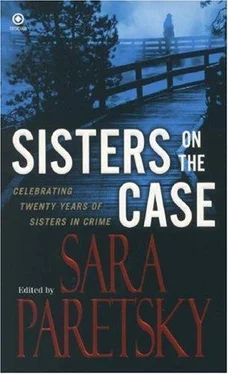The songs they sang came, most of them, out of The Golden Book of Songs . Norah had a pristine copy of it on her piano at home. Mary’s copy looked like an old prayer book that had lost its covers. She tried to picture how this lot would fit in her parlor, where the piano took so much of the room. Mary, when first she’d seen it, let out a whoop. ‘‘Holy Mother of God! It looks just like Reverend Mother!’’ They wouldn’t fit at all, Norah decided. They just didn’t belong there.
‘‘Can you sing ‘Mother Machree,’ Dennis?’’ Rossa asked. ‘‘I don’t think it’s in the book. ‘There’s a place in my heart which no colleen can own,’ ’’ he started, not waiting for Dennis to answer. Suppose Dennis could play the piano, she thought. There were people who played by ear and he might. He picked up on ‘‘Mother Machree’’ and he knew the words by heart. Before he could finish, Rossa demanded ‘‘That Old Irish Mother of Mine.’’
‘‘Give me a minute,’’ Dennis said.
‘‘Let the man wet his whistle,’’ Mary said. ‘‘Isn’t there a drop left in the bottle?’’
Rossa sent his wife out to the car for the spare he kept hidden there.
‘‘Norah.’’ The girl’s mother leaned toward her. She’d seen what happened between her and the upstart, but that wasn’t on her mind at all. ‘‘Do you remember the queer woman at home who’d come out on the castle grounds just before dark? She’d sing ‘The Last Rose of Summer.’ Don’t you remember? A veil round her head so you couldn’t see her face. But every night she’d be there…’’
‘‘You know better than ask Norah about something back home,’’ Mary said. ‘‘She’d turn to salt if she said the word ‘Ireland.’ ’’
That was Mary.
‘‘I remember-I remember the roses on the castle grounds,’’ Norah said. ‘‘And the wreath they sent of them for our mother’s funeral.’’
‘‘Oh, for the love of God!’’ Mary said, out of patience.
Dennis sang ‘‘The Last Rose of Summer.’’
There was no beat Mary could thump to liven ‘‘The Last Rose of Summer’’ and she felt the party turning into slop. She pulled herself up from her chair and announced she was going to fire up the kitchen stove and make tea. She swiped at the curtain with her stick and set it jingling.
‘‘I think I’ll go home now,’’ Norah said. ‘‘It’s been such a grand evening.’’
Dennis was on his feet before she was. ‘‘I’ll walk you home, Miss Lavery,’’ he said.
‘‘Then you don’t need to come back,’’ Mary snapped, quick as a dart.
You could hear the chirp of the crickets.
‘‘Oh dear, dear me,’’ Rossa said then.
Tom Dixon added treacle. ‘‘Stay a while longer, Norah, and we’ll all go out together.’’
Mary would have as soon seen them all go out then. A man as fond of the military as Tom was known to be, you wouldn’t have thought such an appeaser.
But it was Dennis O’Hearn who set things right again. ‘‘Please come back and sit down, Aunt Mary. I know how to fire up the stove, and I’ll put on the kettle for you.’’
‘‘Denny, will you put the kettle on?’’ took on a familiar ring in the next few days, and finding that it pleased her, he brought her a cup of tea every morning as soon as he heard the creak of her bedstead. It was what he had done for his own mother till the day she died.
‘‘She never wanted more than a half cup. She’d send me to spill it out if there was more, and it had to be hot as blazes. Then she’d let it cool off before she drank it.’’
‘‘She wanted you more than she did the tea,’’ Mary told him.
Denny shrugged. If it was so he didn’t understand it.
Mary did not lie long abed on these harvest days- or many others, for that matter-but with morning tea and afternoon tea and the cup she would say she was perishing for in the evening, she learned enough about Denny to know why he had come to her. The last of four boys and by ten years the youngest, he could remember his father saying he should have drowned him the day he was born, the runt of the litter. Until he discovered, when Denny started to school with the sisters, that he had a voice the nuns called sacred. ‘‘He’d hire me out for weddings or funerals for a dollar or two. He’d give me a nickel and spend the rest before my mother got her hand out.’’
It was not the first time Mary had heard a story like it.
‘‘Would you like to hear me sing the ‘Dies Irae’?’’ he offered.
‘‘I would not.’’
Most of Mary’s necessities were obtained through barter, and while she was frugal she was not miserly. But Denny wasn’t long with her before she began to calculate the toll it took of her preserves and garden produce to bring home a pound of bacon. The first time Donel Rossa stopped by after the night of Dennis’ arrival, she broached the possibility of finding a job for Denny in the valley.
‘‘So you’ve decided to keep him,’’ Rossa said. ‘‘You’re a soft touch, Mary.’’
Mary caught something in his tone too intimate for her taste. ‘‘Did you have something to do with him coming, Donel?’’
‘‘Whatever makes you ask a question like that?’’
‘‘It struck me he might be something else that came with my pension.’’
Rossa found a place clear of their feet to spit. ‘‘You’re sharp as a tack this morning, Mary.’’
‘‘I should be. I’ve sat on a few.’’
Rossa laughed. He toed the spittle into the ground. ‘‘You know, Mary, the holy water is going to run dry. I’m not saying the state’ll go dry. God forbid. The Dutchmen have a powerful thirst for their beer, and they’ve a throttle on the legislature.’’
Mary pulled him over to the bench and hung on to his arm. ‘‘Sit down here and tell me what you’re saying.’’ She was never long on patience.
‘‘It’s time I’m thinking about, time and change. I have a horse that climbs the fence whenever I start up the truck. He goes wild. But any day now I’ll go out and see him nuzzling the radiator and the next thing you know, he’ll be willing to go tandem with it. It’s what the wear of time does to man and beast.’’
‘‘You’re an old fart, Donel.’’ Only Mary could say it with affection. She pointed to where Denny was crawling from one currant bush to another, at the bottom of the field. ‘‘He’ll be coming up from there any minute. I sent him back to strip them clean. Now he’ll be counting every currant he puts in the basket.’’
‘‘Have you sent him around the town to make inquiries?’’
‘‘He’ll need more starch in him for that,’’ Mary said.
‘‘Well, there isn’t a hell of a lot of that in the family… Ah, now, Mary, I’ve offended you,’’ Rossa said, for her chin shot out. ‘‘Michael had the heart of a lion. What about Norah? Isn’t there work she could put him to?’’
‘‘She’d eat him alive!’’
Rossa changed the subject in a hurry. ‘‘The nuns brought him up pretty well, didn’t they?’’
‘‘He can do his sums,’’ Mary said. ‘‘He’s not a child, you know, and he’s strong as a bull. He was digging ditches for the city of Chicago till they ran out of money.’’
‘‘I hate to tell you what that qualifies him for on the farm, Mary.’’
She grunted. ‘‘And isn’t the world full of it?’’
Denny came up as Rossa was about to leave. His face was as red as the currants. ‘‘Do you want to do a day’s work for me on the farm now and then?’’ Rossa asked him. ‘‘A dollar a day and your grub.’’
‘‘On the farm,’’ Dennis said, as though to be sure.
‘‘Didn’t I say on the farm? Would I be sending you to Australia? And you’ll have to walk the five miles or hitch a ride on the road.’’
Читать дальше












